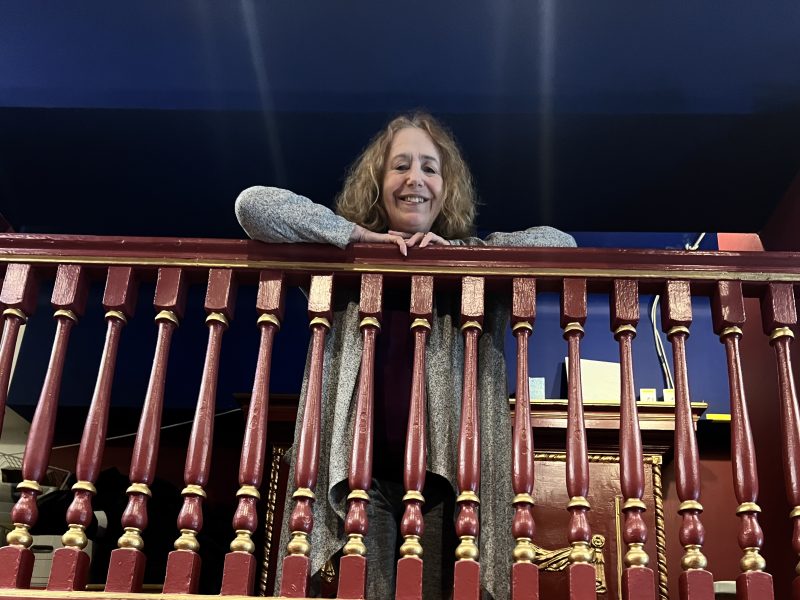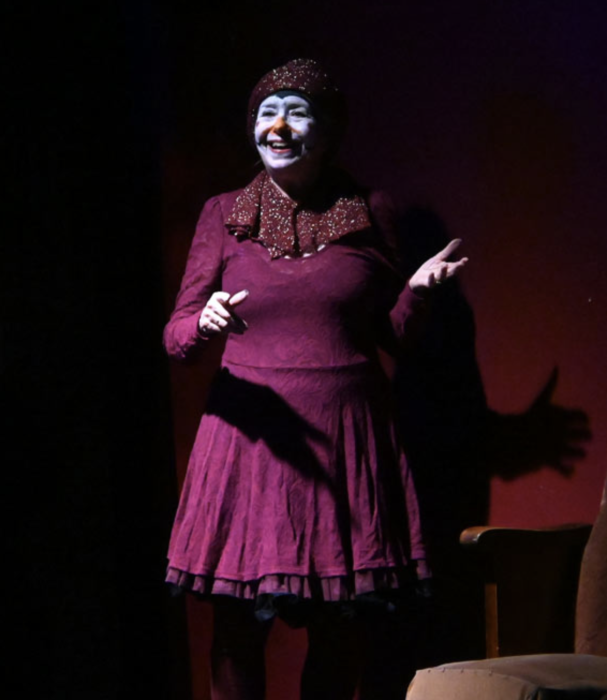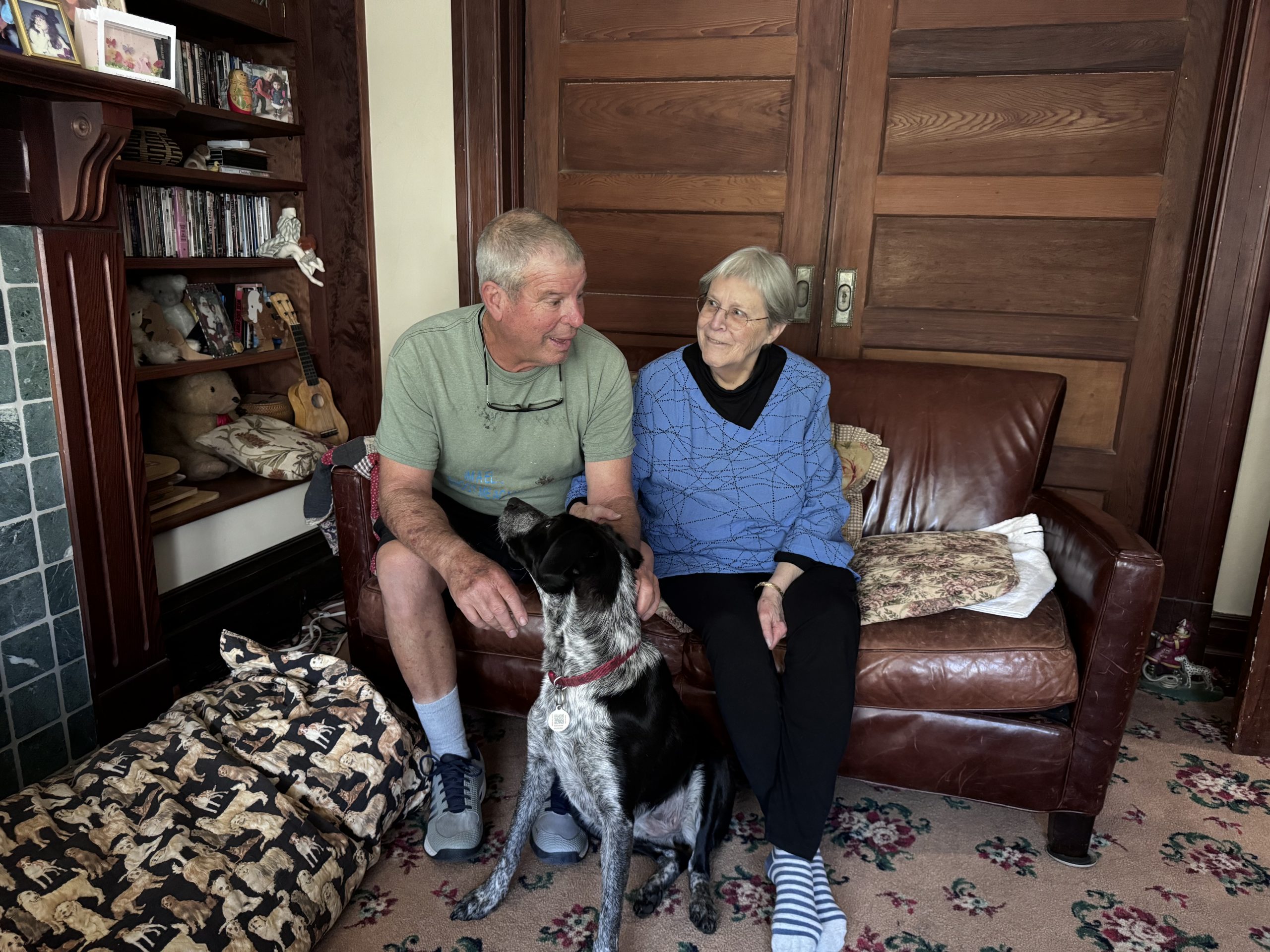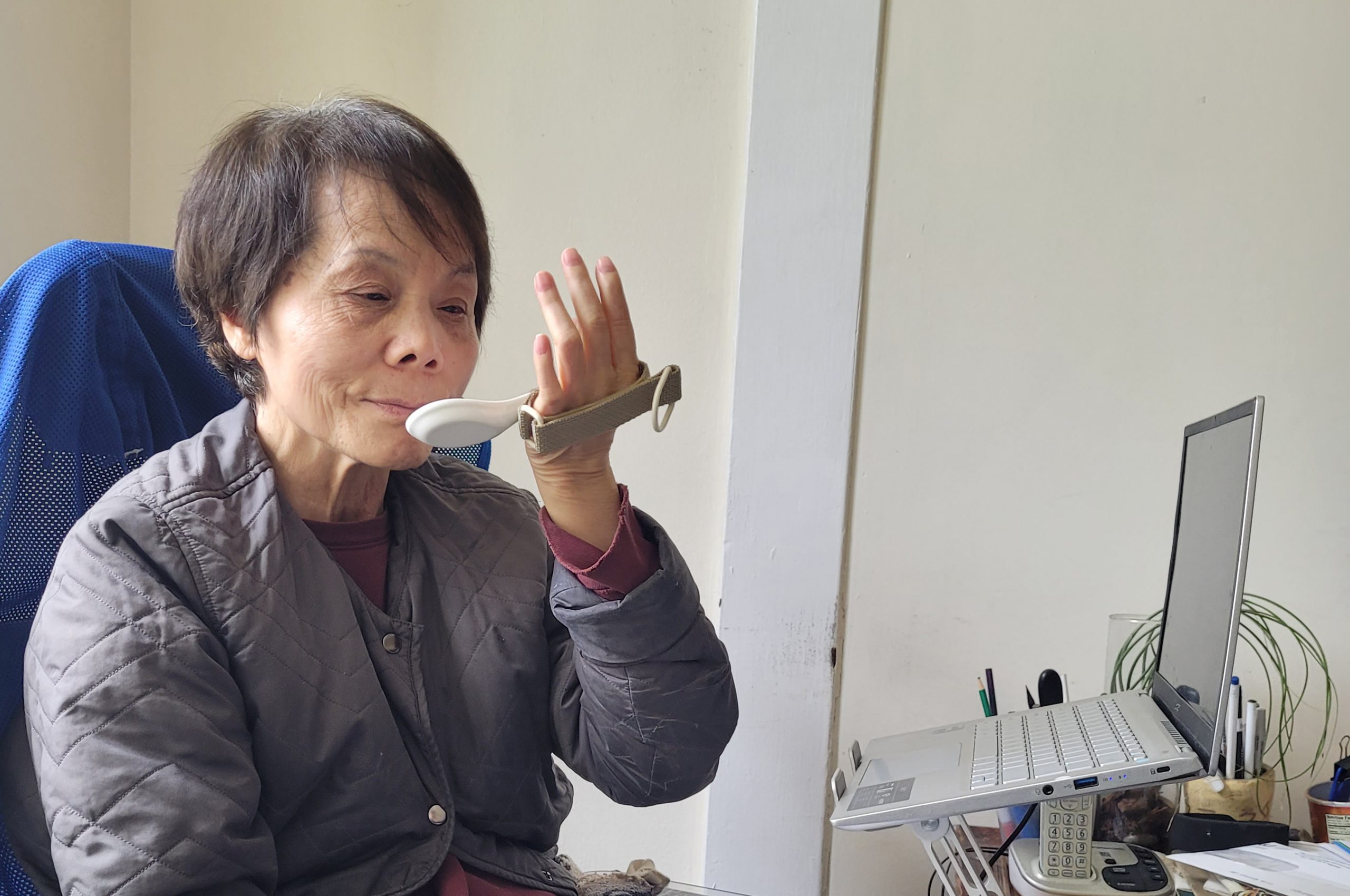Playwright, producer, actor, writer, you-name-it stays enmeshed in Bay area theater despite its ups and downs
When she was a child and the rain was so heavy they couldn’t play on the beach outside their vacation home, Linda Ayres-Frederick and her four siblings would dress up and perform plays. A closet’s sliding doors were their curtain.
“I liked dressing up in my mother’s big hat with flowers and flouncing about.” But it was her tantrums not her acting ability that earned her the family nickname “Sarah Heartburn.”
Fast forward many years and the former “Sarah Heartburn” has built a life dedicated to the theater. In her nearly 50 years in the Bay Area, she’s worked as a playwright, actor, producer, designer, and theater critic. At times, she’s even stepped in as builder, making improvements based on construction techniques learned from her father, a contractor.
As artistic director of the Phoenix Theater Company, Ayres-Frederick has over the last four decades leased and converted seven empty spaces into theaters, from the South of Market and Civic Center to Union Square. “I’m a theatre professional. I think it’s important to know all aspects of the theatre,” she said.

It’s a job that’s kept her on the move. Despite a series of evictions and pandemic-mandated closures. she’s kept the company running, making its name an apt description.
Sometimes, they had to move because the landlord wanted to put the building to another use. Their last eviction was in 2001, from Civic Center spaces that were slated for retrofitting. Ayres-Frederick scrambled and within a few weeks found its current space on Mason Street, a combination of one large and one small theater, where she stages her own plays or rents out.
In 2017, she obtained “legacy status” for the two theaters, a program for businesses in operation for 30 years with no more than a two-year break. It offers access to marketing and business help and grants. In 2000,” she nailed down a long-term lease, using a $90,000 settlement she won from a terrifying auto accident. This year, The Phoenix has a full calendar of performances.
Mutual influence
Ayres-Frederick lives in Cole Valley and prefers not to reveal her age or dwell on misfortune. “I like to keep my drama in the theatre, not in my life,” she said wryly. She’s a prolific writer – 35 of the 50 plays she’s written have been produced.

These days, her calendar is peppered with writing groups and workshops, the structured settings she says help her do her best work. She wrote theatre criticism for the San Francisco Bay Times for almost 10 years and currently serves as vice president of the San Francisco Bay Area Theatre Critics Circle. That position keeps her current on Bay Area theatre events. But she no longer writes critiques. “It takes as much effort to produce a bad play as a good play,” she said. “It doesn’t seem fair to criticize.”
Theatre folk, she said, bring themselves – their upbringing and experiences, observations, and emotional life – to their work. And theater, in turn, shapes their lives. “Your life in the theatre certainly is your palette and you draw from it.”
She was the fourth of five children born to a Washington D.C. couple. Her mother focused on helping her children “differentiate” themselves by developing their artistic interests. For Ayres-Frederick, that meant violin lessons. But her mother, who loved theater, often brought her children along, and Ayress-Fredrick was dazzled by Lady Macbeth.
It was a Royal Shakespeare performance and she was 12 years old. “I saw the Lady Macbeth sleepwalking scene and decided I wanted to be in the theatre, and I wanted to play that role.”
Love of Lady Macbeth
Twelve is probably too young to play Lady Macbeth, but she liked the scene so much that she memorized it and used it when she auditioned for parts as an adult. In high school, she took acting classes and tried her hand at playwriting.

Like her own mother, Ayres-Frederick exposed her daughters – she has two – to the theater when they were young. She even put them on the stage at times, joking that using the kids “is a way to hold down costs.” The early exposure didn’t inspire them to live the theatrical life, “but they did learn to be good critics,” she said.
After graduating from New York’s Sarah Lawrence College, where she majored in the performing arts, she returned to Washington D.C. to continue her theater studies at American University. While there, she won two playwrighting fellowships from the Shubert Foundation.
A three-year sojourn in New Haven, Connecticut, where she and her husband were studying, ended when he was admitted to a San Francisco law school. Although she wanted to remain near New York’s thriving theater scene, the couple and their baby daughter moved to the Bay Area in 1972.
After giving birth to another daughter, Ayres-Frederick joined first one improvisational theater group and then another. When the second disbanded in 1985, Ayres–Fredrick said, she and members of those earlier groups,” rose from the ashes,” and created what became the Phoenix Theater.
Building a theater
Affordable performance spaces were hard to find in San Francisco, but her construction skills came to the fore as the group created two theater spaces South of Market. But 14 years later, their landlord forced them out and the group was again homeless. A series of forced moves – none the fault of the theater group – followed, but Ayres-Frederick refused to give up.

Finally, in 2000, when it appeared they had found a stable space in the Native Sons Building on Mason Street, Ayres-Frederick was hit by a truck and knocked unconscious while crossing a street in Mill Valley.
“I woke up as they were putting me in the ambulance.” A broken wrist, a bump on the head the “size of a golf ball”, a bump on the leg, a few cracked ribs, and vertigo for 11 months slowed her down a bit, she said. Legal action followed.
“Promise me you’ll do something worthwhile with the money,” the judge lectured her after announcing the settlement. That and contributions from family and friends enabled Ayres-Frederick to sign a long-term lease and build two theatres – a main theatre and a smaller theatre – on the sixth floor of the Mason Street building.
That was before the widespread closures mandated by Covid put a stop to public performances. The group used Zoom to present an already scheduled play, but after that, the theater went dark.
The Phoenix Theatre, like others shut by the pandemic, soon found itself nearly broke. Money from federal and state governments, Theatre Bay Area, and her own pocket kept the theatre afloat.
Play an aging
The pandemic was, of course, hard on San Francisco’s theater community. Some, especially small companies, closed, although gay-focused theater is doing well, Ayres-Frederick said. A few groups have experimented with very short runs, sometimes only for a night or two. But she doesn’t see that as a winning strategy because fixed costs are still high and there’s less chance to benefit by word of mouth.
One good thing about Covid for Ayres-Frederick is that it gave her time to rework earlier pieces and do some work on a memoir. “We didn’t know if we had a future so looking back was what we did then.”

She rewrote “Clara,” a play about her grandmother’s exodus from Poland to a new life in America, which she had previously staged. She rewrote, produced, directed, and designed the set and scenery for “The Umbrella Play,” a “light-hearted comedy about love, infidelity, and dying from the perspective of one particularly cherished umbrella.” When the star of the play dropped out, Ayres-Frederick had no choice – she stepped in.
As she’s aged, her concerns as a playwright have shifted. In “White Gloves and Patent Leather Shoes,” a 10-minute short produced in San Francisco, death does not extinguish sibling rivalry as three sisters dress the now-deceased fourth for the funeral viewing.
Another short play, “101 California,” focused on the two surviving witnesses of the mass shooting at that building in 1993.
A woman of many hats – from her mother’s in childhood plays to roles as actor, playwright, director, producer, costumer, scene designer, and theater builder – Sarah Heartburn, as she’s still called by her older sister, continues to find her life best fulfilled in the theater.






Patti
Great read! Such dedication and determination...I have to get to the Phoenix! Thanks Judy!
jeanne powell
I like this piece very much. The ups and downs of being an artist and living on one's own in an expensive city like San Francisco -- wow, do I have stories as well. Poet, performing artist, film critic on a fixed income, dealing with chronic condition, utilizing imagination and creativity to manifest and create a fulfilling life. Bravo. Well done.
Joanne Engelhardt
Linda is a dedicated artist -- a tireless worker -- a gifted actress! I'm delighted that we've had occasion to act and/or work together over the years.
Ms. York
Interesting career - and article. One take-away: I'm making sure my final wishes are specific about someone besides my 3 sisters dressing me for my send-off into the afterlife.